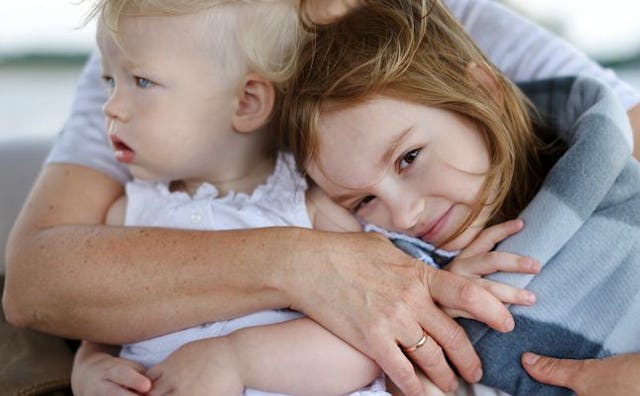The Reason I Do Everything For My Kids

The year was 1988. I was nine, watching my mother being motherly and dreaming of having children of my own one day. I dreamt of a lovely Laura Ashley nursery set. It would be lovingly put together by my husband, who bore a slight resemblance to Jonathan Brandis. I never pondered what would happen after that baby “IneedyouIneedyouIneedyou” stage was over. I just thought of bottles and burping and piles of feathery-smelling baby clothes. I never thought about what mothering would be like in terms of the big picture. I never thought about mothering in terms of trying to raise little people who gradually became big people who could do things for themselves.
This became very evident over Christmas break when my husband was home for an extended period of time. I would have the kitchen clean, floors vacuumed, making a mental note to pat myself on the back because I had done all this while the kids were home. You know what it’s like when they’re home. You’re not just cleaning up after them, you’re cleaning up while they are around, which is not for the faint of heart. Brushing your teeth while you’re eating Oreos, and all that.
I’d sit down after cleaning the dining room floor for the hundredth time that day, giddy about opening my new library book. Inevitably, one of my children would come up to me and say something like,
“Mom, where are my pants?”
“Mom, what did you do with my toothbrush?” (because, you know, I BRUSH MY NINE YEAR OLD’S TEETH FOR HER), or
“Mom, I’m thirsty. Can you get me a cup of water?”
In those moments the first thing I think is that I just sat down and I really don’t want to do this thing that my child wants me to do for him. The second thing I think is this: “When I’m older I will regret not having done this or that thing. After all, you know what ‘they’ always say (and ‘they’ are usually grandmothers who don’t offer to babysit):
“Babies don’t keep!”
“The cobwebs will always be there!”
“Kids grow so fast!”
While anyone who has watched a mewly newborn morph overnight into a screaming mac ‘n cheese-covered-toddler knows that these things are definitely true, these facts have an adverse effect on me. I suddenly want to do everything for and with my children because what if tomorrow I don’t have the chance?
There it is. We just got to the heart of it.
The other scenarios niggle at the edges of my mind:
The child who died of a brain tumor of the age four.
The teenager killed in an auto accident. The woman who has tried for a decade to have just one living child.
It suddenly seems selfish for me not to get up from whatever it is I am enjoying in order to say “yes” to whatever my child is asking for.
When I first met my daughter it was under the glare of harsh surgical lights. I caught a glimpse of her, then she was gone. Not gone gone, just a prisoner of all the trappings of the NICU. At that point there was nothing I could do for her but listen to the nurses talking as they wheeled her away. Here I was, finally a mom, and the only thing I could do was to lay there, unmoving, being stitched up like the Velveteen Rabbit’s derelict blanket.
When it became evident that we could take her home even though she was going to need special care, I jumped at the chance to do everything for her. I absolutely reveled in it.
Now she is nearly ten years old. When I ask her to brush her hair, she sighs quietly. She utters in a voice so very tweeny:
“Can’t you just do it? You always do it faster!”
Is faster, shorter, better, the point?
I don’t know. This is what I’m beginning to ask myself.
And yet giving in is what I’ve done, over and over and over again, because the following things are more efficient when done by me:
Hair brushing
Tooth brushing Room cleaning Table setting Towel picking-up And yes, I’ve even forged homework.
I just admitted that. Stop clutching your pearls.
I feel like I have to apologize for doing everything for my kids, but if I don’t do stuff for or with my kids, the guilt I feel for not doing that stuff translates into, “What if I don’t have them tomorrow?” And so, I guess I just keep doing what I’m doing, grabbing those moments however imperfect they are.
Even if they involve wiping mattered little mouths or occasionally forging my child’s signature, and badly, so the teacher won’t notice.
Related post: The Myth of Protection
This article was originally published on